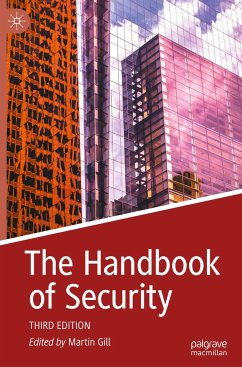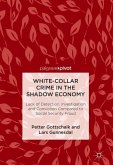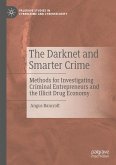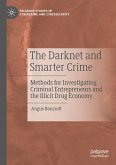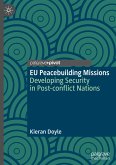The Handbook of Security
Herausgegeben:Gill, Martin
The Handbook of Security
Herausgegeben:Gill, Martin
- Gebundenes Buch
- Merkliste
- Auf die Merkliste
- Bewerten Bewerten
- Teilen
- Produkt teilen
- Produkterinnerung
- Produkterinnerung
The substantially revised third edition of The Handbook of Security provides the most comprehensive analysis of scholarly security debates and issues to date. It reflects the developments in security technology, the convergence of the cyber and security worlds, and the fact that security management has become even more business focused. It covers newer topics like terrorism, violence, and cybercrime through various offence types such as commercial robbery and bribery. This handbook comprises mostly brand new chapters and a few thoroughly revised chapters, with discussions of the impact of the…mehr
Andere Kunden interessierten sich auch für
![White-Collar Crime in the Shadow Economy White-Collar Crime in the Shadow Economy]() Petter GottschalkWhite-Collar Crime in the Shadow Economy21,99 €
Petter GottschalkWhite-Collar Crime in the Shadow Economy21,99 €![Green Crime in Mexico Green Crime in Mexico]() Green Crime in Mexico112,99 €
Green Crime in Mexico112,99 €![The Darknet and Smarter Crime The Darknet and Smarter Crime]() Angus BancroftThe Darknet and Smarter Crime76,99 €
Angus BancroftThe Darknet and Smarter Crime76,99 €![The Darknet and Smarter Crime The Darknet and Smarter Crime]() Angus BancroftThe Darknet and Smarter Crime75,99 €
Angus BancroftThe Darknet and Smarter Crime75,99 €![Police Research in the Federal Republic of Germany Police Research in the Federal Republic of Germany]() Police Research in the Federal Republic of Germany75,99 €
Police Research in the Federal Republic of Germany75,99 €![EU Peacebuilding Missions EU Peacebuilding Missions]() Kieran DoyleEU Peacebuilding Missions29,99 €
Kieran DoyleEU Peacebuilding Missions29,99 €![Encyclopedia of Security and Emergency Management Encyclopedia of Security and Emergency Management]() Encyclopedia of Security and Emergency Management420,99 €
Encyclopedia of Security and Emergency Management420,99 €-
-
-
The substantially revised third edition of The Handbook of Security provides the most comprehensive analysis of scholarly security debates and issues to date. It reflects the developments in security technology, the convergence of the cyber and security worlds, and the fact that security management has become even more business focused. It covers newer topics like terrorism, violence, and cybercrime through various offence types such as commercial robbery and bribery. This handbook comprises mostly brand new chapters and a few thoroughly revised chapters, with discussions of the impact of the pandemic. It includes contributions from some of the world's leading scholars from an even broader geographic scale to critique the way security is provided and managed. It speaks to professionals working in security and students studying security-related courses.
Chapter 5 is available open access under a Creative Commons Attribution 4.0 International License via link.springer.com.
Chapter 5 is available open access under a Creative Commons Attribution 4.0 International License via link.springer.com.
Produktdetails
- Produktdetails
- Verlag: Palgrave Macmillan / Springer International Publishing / Springer, Berlin
- Artikelnr. des Verlages: 978-3-030-91734-0
- 3. Aufl.
- Seitenzahl: 1076
- Erscheinungstermin: 23. Juni 2022
- Englisch
- Abmessung: 241mm x 160mm x 63mm
- Gewicht: 1753g
- ISBN-13: 9783030917340
- ISBN-10: 3030917347
- Artikelnr.: 62772171
- Herstellerkennzeichnung
- Springer-Verlag GmbH
- Tiergartenstr. 17
- 69121 Heidelberg
- ProductSafety@springernature.com
- Verlag: Palgrave Macmillan / Springer International Publishing / Springer, Berlin
- Artikelnr. des Verlages: 978-3-030-91734-0
- 3. Aufl.
- Seitenzahl: 1076
- Erscheinungstermin: 23. Juni 2022
- Englisch
- Abmessung: 241mm x 160mm x 63mm
- Gewicht: 1753g
- ISBN-13: 9783030917340
- ISBN-10: 3030917347
- Artikelnr.: 62772171
- Herstellerkennzeichnung
- Springer-Verlag GmbH
- Tiergartenstr. 17
- 69121 Heidelberg
- ProductSafety@springernature.com
Martin Gill is a criminologist who holds honorary/visiting Chairs at the Universities of Leicester and London, UK. Martin has been actively involved in a range of studies relating to different aspects of security, private policing and business crime. Martin is Fellow of The Security Institute, a member of the Company of Security Professionals (and a Freeman of the City of London). He is Trustee of the ASIS Foundation. In 2010 he was recognised by the BSIA with a special award for 'outstanding service to the security sector'. In 2016 he was awarded the Imbert Prize by the Association of Security Consultants. In 2016 ASIS International awarded him a Presidential Order of Merit for distinguished service. In 2016 he was entered onto the Register of Chartered Security Professionals. Martin is the Founder of the Outstanding Security Performance Awards (the OSPAs and Cyber OSPAs) and Tackling Economic Crime Awards (the TECAs).
1. Introduction,Martin Gill.- PART 1. The Subject Area of Security.- 2. Security: History, Genealogy, Ideology, Dodsworth, F.- 3. Shifting The Boundaries Of Security: Meanings And Applications, Dr Helen Forbes-Mewett.- 4. Explaining The Impact And Implications Of Covid-19 On Crime Rates: A Criminological Perspective , Rob Mawby.- 5. Forensic Intelligence And Traceology In Digitalised Environments: The Detection And Analysis Of Crime Patterns To Inform Practice, Olivier Ribaux Simon Baechler, Quentin Rossy.- 6. Changing Threats And Challenges In International Relations: Debating (In)Securities And Ways To Manage Them, Tochukwu Omenma And Silvia D'amato.- 7.- PART 2. Offence Types. - Private Security/Private Military: One Phenomenon Or Two?, Adam White.- 8. The Evolution Of The Terrorism And Extremism Landscape In The Age Of Covid-19, Kumar Ramakrishna.- 9. Violence Against Shop Workers: Trends And Triggers In The United Kingdom, Emmeline Taylor.- 10. Burglary Research And Conceptualizing The Community Security Function, A Learning Organization, Jim Calder April.- 11. Meeting The Challenges Of Fraud In A Digital World, Cassandra Cross.- 12. Examining Private Sector Strategies For Preventing Insurance Fraud, Dr. Yuriy Timofeyev And Mike Skidmore.- 13. Economic And Industrial Espionage: Characteristics, Techniques And Response, Mark Button And Susanne Knickmeier.- 14. Combatting Money Laundering: Some Considerations For Security Professionals, Professor Mike Levi.- 15. - PART 3. Crime And Security In Different Domains. - Corruption, Bribery And Corporate Crime: Victims And Perpetrators, Hock, B., Shepherd, D And Button, M.- 16. Securing The Bioeconomy: Exploring The Role Of Cyberbiosecurity, Patrick Walsh.- 17. Border Security: An Essential But Effective Tool In Combating Cross-Border Crime, Prof Anthony Minnaar.- 18. Security In The Chemical Industry: Theory And Practice, Chao Chen And Genserik Reniers.- 19. The Evolution Of College And University Campus Security In The United States: Congressional Legislation, Administrative Directives, And Policing, Bonnie Fisher, Michelle Protas, Logan Lanson And John Sloan.- 20. Addressing The Security Issues Related To Illegal Commercial Fishing, Gohar A. Petrossian And Ron Clarke.- 21. Crime On The Darknet: The Case Of Brand Abuse, Victoria Wang. Jim Gee, Mark Button.- 22. - PART 4. Researching Security. - Representing Security: A Popular Criminology Of Private Policing In Film, Steven Kohm.- 23. Systematic Reviews And Meta-Analysis Of Security, Matthew Manning, Gabriel T.W. Wong, Hien-Thuc Pham.- 24. Realistic Evaluation And The 5is: A Systematic Approach For Evaluating Security Interventions, Andrew Newton.- 25. Script Analysis For Security Professionals: Past, Present And Future, Dr. Harald Haelterman.- 26. Using Mobile Applications And Physiological Sensing To Measure Perception Of Security In Built Environments, Reka Solymosi, Ines Guedes, Laura Vozmediano.- 27.Researching The Relationship Between Tourism And Crime: The Tourism Industry And The Disenfranchised Citizens, Rob I Mawby And Zarina I Vakhitova.- PART 5. Security Products And Services. - 28. Security Officers: The Public Face Of The Security Industry, Mahesh K. Nalla And Alison Wakefield.- 30. Private And Corporate Investigations - Internal Security Governance Within Organisation, Clarissa Meerts.- 31. Training And Education Within The Security Sector: Challenges And Opportunities For Development, Declan Garrett, Glen Kitteringham And Ken Livingstone.- 32. CCTV As A Socio-Technology, Markus Lahtinen And Benjamin Weaver.- 33. Intrusion Detection Systems In The Protection Of Assets, David J Brooks.- PART 6. Towards a Better Security. - 34. Crime And The Consumer Internet Of Things, Shane D Johnson, John M Blythe, Eon Kim And Nissy Sombatruang.- 35. Professional Security In The Fourth Industrial Revolution, Alison Wakefield And Mike Gips.- 36. Security Or Liberty? Human Rights And Protest, Kate Moss.- 37. Facilitating Best Practice In Security: The Role Of Regulation, Tim Prenzler And R Sarre.- 38. Formal And Informal (In)Security In South Africa, G. D. Breetzke.- 39. Facing Up To The Future: The Role Of Horizon-Scanning In Helping Security Keep Up With The Changes To Come, Paul Ekblom.- 40. The Securitization Of Terrestrial Protected Areas, William D. Moreto.- PART 7. The Impacts of Security. - 41. The Carbon Footprint Of Crime And Security,Helen Shoesmith (Nee Skudder), Ian Brunton-Smith, Andromachi Tseloni, Rebecca Thompson, And Angela Druckman.- 42. Security And International Crime Drops, Nick Tilley And Graham Farrell.- 43. The Role Of Crime Prevention Through Environmental Design (Cpted) In Improving Household SecurityRachel Armitage, Lisa Tompson.-44. Examining The Use Of Video Technologies In Retailing, Adrian Beck.- 45. Making An Economic Case For Security, Matthew Manning, Christopher M. Fleming, Hien-Thuc Pham.- 46. Business Resilience To Crime: The Harms Of Crime, Business Fragility And The Role Of Security, Matt Hopkins.- 47. Security In Perspective, Martin Gill.
1. Introduction,Martin Gill.- PART 1. The Subject Area of Security.- 2. Security: History, Genealogy, Ideology, Dodsworth, F.- 3. Shifting The Boundaries Of Security: Meanings And Applications, Dr Helen Forbes-Mewett.- 4. Explaining The Impact And Implications Of Covid-19 On Crime Rates: A Criminological Perspective , Rob Mawby.- 5. Forensic Intelligence And Traceology In Digitalised Environments: The Detection And Analysis Of Crime Patterns To Inform Practice, Olivier Ribaux Simon Baechler, Quentin Rossy.- 6. Changing Threats And Challenges In International Relations: Debating (In)Securities And Ways To Manage Them, Tochukwu Omenma And Silvia D'amato.- 7.- PART 2. Offence Types. - Private Security/Private Military: One Phenomenon Or Two?, Adam White.- 8. The Evolution Of The Terrorism And Extremism Landscape In The Age Of Covid-19, Kumar Ramakrishna.- 9. Violence Against Shop Workers: Trends And Triggers In The United Kingdom, Emmeline Taylor.- 10. Burglary Research And Conceptualizing The Community Security Function, A Learning Organization, Jim Calder April.- 11. Meeting The Challenges Of Fraud In A Digital World, Cassandra Cross.- 12. Examining Private Sector Strategies For Preventing Insurance Fraud, Dr. Yuriy Timofeyev And Mike Skidmore.- 13. Economic And Industrial Espionage: Characteristics, Techniques And Response, Mark Button And Susanne Knickmeier.- 14. Combatting Money Laundering: Some Considerations For Security Professionals, Professor Mike Levi.- 15. - PART 3. Crime And Security In Different Domains. - Corruption, Bribery And Corporate Crime: Victims And Perpetrators, Hock, B., Shepherd, D And Button, M.- 16. Securing The Bioeconomy: Exploring The Role Of Cyberbiosecurity, Patrick Walsh.- 17. Border Security: An Essential But Effective Tool In Combating Cross-Border Crime, Prof Anthony Minnaar.- 18. Security In The Chemical Industry: Theory And Practice, Chao Chen And Genserik Reniers.- 19. The Evolution Of College And University Campus Security In The United States: Congressional Legislation, Administrative Directives, And Policing, Bonnie Fisher, Michelle Protas, Logan Lanson And John Sloan.- 20. Addressing The Security Issues Related To Illegal Commercial Fishing, Gohar A. Petrossian And Ron Clarke.- 21. Crime On The Darknet: The Case Of Brand Abuse, Victoria Wang. Jim Gee, Mark Button.- 22. - PART 4. Researching Security. - Representing Security: A Popular Criminology Of Private Policing In Film, Steven Kohm.- 23. Systematic Reviews And Meta-Analysis Of Security, Matthew Manning, Gabriel T.W. Wong, Hien-Thuc Pham.- 24. Realistic Evaluation And The 5is: A Systematic Approach For Evaluating Security Interventions, Andrew Newton.- 25. Script Analysis For Security Professionals: Past, Present And Future, Dr. Harald Haelterman.- 26. Using Mobile Applications And Physiological Sensing To Measure Perception Of Security In Built Environments, Reka Solymosi, Ines Guedes, Laura Vozmediano.- 27.Researching The Relationship Between Tourism And Crime: The Tourism Industry And The Disenfranchised Citizens, Rob I Mawby And Zarina I Vakhitova.- PART 5. Security Products And Services. - 28. Security Officers: The Public Face Of The Security Industry, Mahesh K. Nalla And Alison Wakefield.- 30. Private And Corporate Investigations - Internal Security Governance Within Organisation, Clarissa Meerts.- 31. Training And Education Within The Security Sector: Challenges And Opportunities For Development, Declan Garrett, Glen Kitteringham And Ken Livingstone.- 32. CCTV As A Socio-Technology, Markus Lahtinen And Benjamin Weaver.- 33. Intrusion Detection Systems In The Protection Of Assets, David J Brooks.- PART 6. Towards a Better Security. - 34. Crime And The Consumer Internet Of Things, Shane D Johnson, John M Blythe, Eon Kim And Nissy Sombatruang.- 35. Professional Security In The Fourth Industrial Revolution, Alison Wakefield And Mike Gips.- 36. Security Or Liberty? Human Rights And Protest, Kate Moss.- 37. Facilitating Best Practice In Security: The Role Of Regulation, Tim Prenzler And R Sarre.- 38. Formal And Informal (In)Security In South Africa, G. D. Breetzke.- 39. Facing Up To The Future: The Role Of Horizon-Scanning In Helping Security Keep Up With The Changes To Come, Paul Ekblom.- 40. The Securitization Of Terrestrial Protected Areas, William D. Moreto.- PART 7. The Impacts of Security. - 41. The Carbon Footprint Of Crime And Security,Helen Shoesmith (Nee Skudder), Ian Brunton-Smith, Andromachi Tseloni, Rebecca Thompson, And Angela Druckman.- 42. Security And International Crime Drops, Nick Tilley And Graham Farrell.- 43. The Role Of Crime Prevention Through Environmental Design (Cpted) In Improving Household SecurityRachel Armitage, Lisa Tompson.-44. Examining The Use Of Video Technologies In Retailing, Adrian Beck.- 45. Making An Economic Case For Security, Matthew Manning, Christopher M. Fleming, Hien-Thuc Pham.- 46. Business Resilience To Crime: The Harms Of Crime, Business Fragility And The Role Of Security, Matt Hopkins.- 47. Security In Perspective, Martin Gill.

